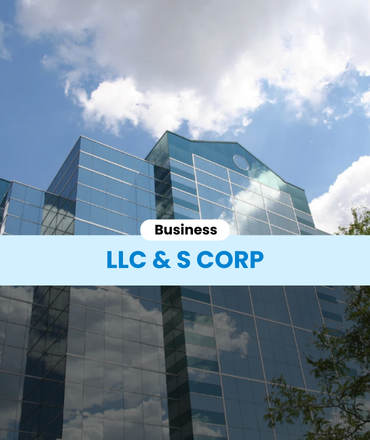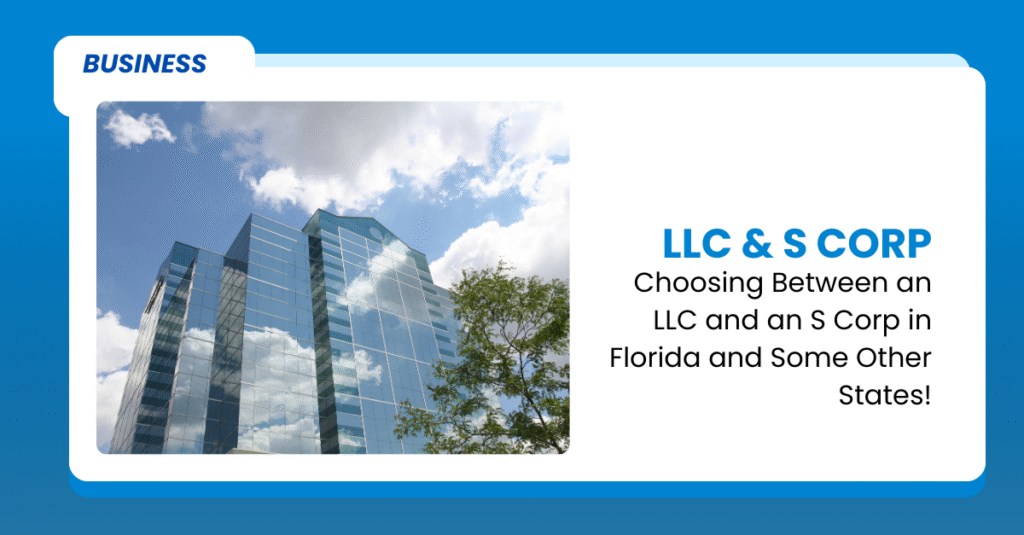
LLC and S Corp, When I first started my business in Florida, I thought the hardest part would be finding clients and making sales. But very quickly, I realized that one of the most important early decisions I had to make was how to set up my business legally and for tax purposes. Should I stay as a simple LLC, or elect to be treated as an S Corporation?

Choosing Between an LLC and S Corp in Florida and some other states
At first, I had no idea what the differences really meant. All I knew was that both options would protect my personal assets (my home, my car, my bank account) if the business ever got sued. But when I dug deeper, I discovered that the real difference comes down to taxes and paperwork.
Let me share my experience, especially living here in Florida, where the rules are different compared to states like California or New York.
—
Starting as an LLC in Florida
I first set up my company as an LLC. In Florida, it’s very simple: you file online with SunBiz (the Florida Division of Corporations website), pay about $125, and you’re in business. Every year after that, I just pay a $138.75 annual fee to keep it active.
The nice thing about an LLC is flexibility. By default, the IRS sees an LLC with one owner (like me at first) as a sole proprietorship. LLC and S Corp, That means all my profits went directly to my personal tax return. I didn’t need a separate corporate tax return.
Example:
Let’s say my business made $80,000 in profit in one year.
As an LLC, I paid:
Federal income tax (based on my tax bracket).
Self-employment tax of 15.3% on the full $80,000 (this covers Social Security and Medicare).
That self-employment tax hit me hard. 15.3% of $80,000 is $12,240, just in self-employment taxes. And that’s before regular income tax.
That’s when I started looking at the S Corp option.
—
Switching to an S Corporation
Here’s where things got interesting. An S Corp isn’t a type of company — it’s actually a tax election you file with the IRS (Form 2553). LLC and S Corp, You can keep your Florida LLC but choose to have it taxed like an S Corp.
Why does this matter? Because with an S Corp, you don’t pay self-employment tax on your entire profit. Instead, you pay yourself a reasonable salary (subject to payroll taxes), and the rest of the profit can be taken as distributions — which are not hit with self-employment tax.
Example with the same $80,000 profit:
As an S Corp, let’s say I pay myself a $40,000 salary.
Payroll taxes (Social Security + Medicare) apply to that $40,000, which is $6,120.
The remaining $40,000 profit I take as a distribution. No self-employment tax on that.
So instead of paying $12,240 in self-employment tax like before, I only paid $6,120. That’s a savings of $6,120 in just one year.
That was a game changer for me.
—
Florida vs. Other States
One of the biggest perks of running a business in Florida is that there’s no state income tax. Whether you’re an LLC or an S Corp, you don’t pay personal state income tax here. LLC and S Corp, That puts Florida entrepreneurs at an advantage compared to high-tax states.
For example:
California – If I lived there, not only would I pay federal tax, but I’d also pay up to 13.3% in state income tax on my business profits. On top of that, California charges an annual LLC franchise fee that gets higher as your income increases.
New York – LLCs and S Corps in New York must pay state income tax (up to 10.9%), plus New York City has its own business taxes.
Texas – Like Florida, no personal income tax. LLC and S Corp, But Texas does have a franchise tax based on revenue once you cross a certain threshold.
In Florida, the simplicity and low fees made it easy for me to experiment with the S Corp structure without worrying about an extra state income tax burden.
—
The Drawbacks I Noticed
It wasn’t all sunshine. Running an S Corp came with more complexity:
1. Payroll – I had to set myself up as an employee and run payroll, which meant filing quarterly reports and paying payroll taxes. I ended up using a payroll service to handle it (around $40–$70/month).
2. Corporate Formalities – Even though I was just one person, I had to keep meeting minutes, issue myself W-2s, and follow more formal rules.
3. Accountant Fees – My taxes got more complicated. Instead of just one Schedule C with my personal return, I had to file an 1120-S corporate return for the business and then my personal 1040. My accountant charged me a few hundred dollars more.
But when I weighed those costs against saving thousands in self-employment tax, the S Corp was worth it once my business hit a certain profit level.
—
When an LLC Made More Sense
I always tell my Florida friends starting out: if you’re making less than $40,000 in profit per year, sticking with a simple LLC might be better. The tax savings of an S Corp usually don’t outweigh the extra fees and complexity at lower income levels.
For example:
If my profit was only $25,000, the self-employment tax would be $3,825.
The cost of payroll services + accountant fees might eat up most of the savings if I switched to an S Corp.
So, I recommend starting with an LLC, and once your profit climbs past $50,000–$60,000, that’s when it really makes sense to elect S Corp status.
—
My Final Takeaway
Looking back, I’m glad I started as a Florida LLC — it gave me time to grow without overcomplicating things. LLC and S Corp, But once my business income grew, electing to be taxed as an S Corp saved me thousands each year in taxes.
LLC and S Corp – If you’re in a state like California or New York, the decision is trickier because of state income tax and higher fees. But here in Florida, the S Corp has been a huge advantage, especially once I learned to handle the extra paperwork.
My advice:
Start simple with an LLC.
Switch to S Corp when the numbers make sense.
LLC and S Corp, And always run the numbers with a CPA — what worked for me in Florida might look very different where you live.
Building a business is one of the smartest moves you can make for both financial growth and tax savings. From deductions to retirement contributions and income flexibility, the opportunities are endless. Entrepreneurs like Omar C Solari and Omar Solari show that business ownership comes with both challenges and rewards, but one of the biggest wins is the ability to take control of your money.If you’re serious about reducing your tax burden and building wealth, now might be the right time to start your entrepreneurial journey. And while your story may look very different from that of Omar Solari Florida, one truth remains the same: Why Opening a Business Can Be Better for Taxes? Business ownership puts you in charge of not just your income, but also your future.

Dope content
Very interesting stuff. Very factual.
Great breakdown of the topic! I’ve been struggling to decide between starting an LLC or sole proprietorship, and this really clarified things.
Love how you explained this in simple terms. Business blogs usually get too technical, but this was easy to digest.